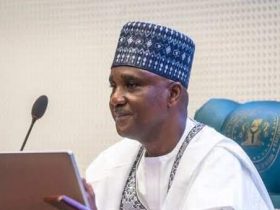By Gloria Bugger -BBC chief political analyst
While much of the American public never ceases to be amazed at the President’s tweets, antics or declarations from the stump, those who have known him for years take it in stride. “This is who he is,” says a longtime ally, referring to the NFL take-a-knee conflict. “He triples down, and he thinks this all is great.”
Huh? He’s got a disaster in Puerto Rico (not to mention two others in Texas and Florida), a failed health care bill, a pending tax reform fight, a potential deal on Dreamers that could anger his base — oh, and by the way, a confrontation with North Korea that reaches new rhetorical excesses daily.
But he’s obsessively tweeting about the NFL — or Steph Curry refusing to pay homage at the White House (President to Warriors: Don’t come). Over and over again. More than 20 times.
So what’s he thinking? First, says a friend, “he thinks all of this is great for him. He says that his base and most of America agree with him.” Indeed, the President told this friend, “I say what they all want to say.” The feeling, he adds, is that the President believes he is “doing what he was sent to Washington to do, to chip away at all of these establishment notions in places where people are afraid to go.”
But not brave Donald Trump. He’s so brave that he’s willing to cast aside the First Amendment so those “sons of bitches,” as the President calls them, don’t take a knee as a form of protest when the anthem is played. Instead, he’d like them fired. Maybe it’s not such a brave move, especially considering that what he cares about is deeply political: playing to his base of support with his version of patriotism. He knew it would play well when he campaigned in Alabama the other night. That way, if his base is jittery over his deals with the Democrats, he can throw them a bone. Or a flag.
It’s intuitive, this Trump MO. When doing the CNN documentary on candidate Trump last year, I spoke with Louise Sunshine, a vice president of the Trump Organization for a dozen years in the seventies and eighties. Something she said about Trump’s management style stuck with me: “Donald has always managed to walk into a meeting and say something nobody else ever expected him ever to say, upend the entire meeting, leave everybody agog and control every situation that way…”
Well, there you go. Only now it’s not a small business meeting, but a national conversation. And we follow him around like moths to a flame. One minute, it’s North Korea. But wait. There’s an incendiary tweet on the NFL. Onto that field.
Yet there’s more here than intuition. When this President feels insulted, he punches back. The President who has insults for everyone cannot abide criticism of himself. Barbara Res, another ex-Trump employee, told me “he doesn’t like being challenged. Ever.” And when he was, “he was very loud and mean and quick to react.” (CC: General Kelly, who, according to the New York Times, told other White House staffers that in his 35 years of service he has never been spoken to in the way Trump speaks to him.)
Unfortunately for Trump, criticism is impossible to avoid if you’re president. And so this President becomes consumed by grievance. And he’s equal opportunity: whether it’s about his attorney general, Jeff Sessions, or about Hillary Clinton or the NFL or the size of the crowd at his inauguration. No slight is too small to be dealt with by the most powerful man in the world.
He’ll come at you, as he did in his real estate glory days when he even posed as his own press secretary to sing his own praises and critique others in Trumpian fashion. But there’s a difference: Former employee Sunshine recalled that, back in the day, when he got bad press, she would run into his office and say, “Look, Donald, this is terrible,” and he would tell her to calm down, reminding her that all publicity is good publicity.










Leave a Reply